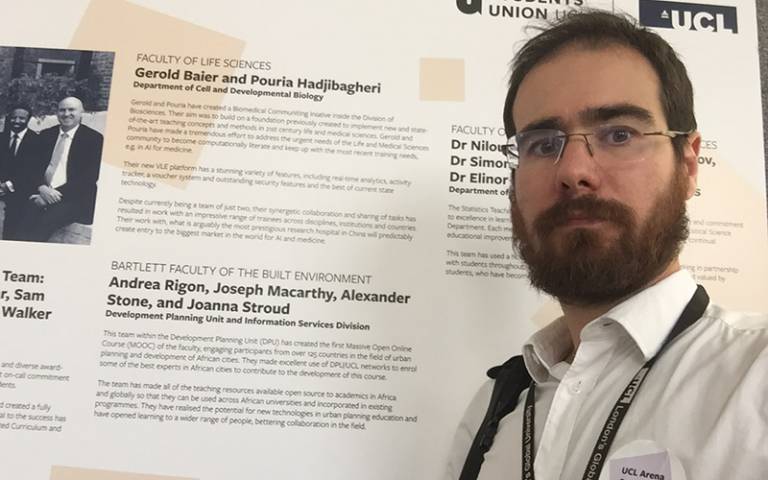DPU's Andrea Rigon part of team awarded a UCL Education Award
3 June 2019
Congratulations to the team including Andrea Rigon from the DPU, Njala University, SLURC and UCL Digital Education who were awarded the UCL Education Award and also shortlisted for a Provost’s award.

The objective of the team (Dr Andrea Rigon, Direcor of Studies, DPU; Dr Joseph Macarthy, Njala University, SLURC Executive Director; Alexander Stone, DPU alumnus and SLURC Learning Officer; Jo Stroud, Distance Learning Facilitator, UCL Digital Education) has been to introduce some of the processes, conceptual issues, and tensions that exist within urban planning and development for African cities to professionals in Sub-Saharan Africa who wish to pursue a career in the field. Such material has previously been offered in a face-to-face, intensive course delivered with Njala University in Sierra Leone and has been very successful and heavily oversubscribed. Despite this demand, for many there exist issues which prevent travel to study, and it was considered, therefore, that delivering some of the topics as an open online course could enable the team to meet demand. However, the approach also presented a unique opportunity to bring together, open access to, and enable the subsequent reuse of rich and topic-specific testimony from UCL, international, and in-country experts.
The team engaged in the process of learning design with recognition that the course would be a different experience than they were used to, including far greater numbers of learners with a distinct diversity of prior cultural and educational experiences. As such, they engaged with open educational practices in a variety of ways, employing the practical principles of Universal Design to deliver content that was accessible to varied audiences, and open pedagogic methods. For example, while the course utilised Freetown as an overarching case study, learners were invited to discuss, apply, align the concepts and techniques covered to their own contexts, wherever they were in the world.
The finished course, delivered via FutureLearn, was free to access over its duration, but was further earmarked for the British Council Study UK campaign, in which learners from non-OECD countries would have their course upgrade fee waived, providing unlimited access to the course materials after the run had ended and the opportunity to participate in peer reviewed assessment tasks. The second run of the course has sought to continue this opportunity through reinvestment of its own revenue in upgrade vouchers for those who meet similar economic criteria. In total it has attracted approximately 2500 learner sign ups from 125 countries and territories internationally
A further decision was taken to make course content accessible outside of its original context as open educational resources, or OER. This involved creation of Creative Commons licensed, small file size PDFs for text-based material, incorporating links to standard definition video files and additional metadata to aid search findability. The provision served to both offer a stable, downloadable version of material for those who may be looking to study from low or intermittent bandwidth locations, but furthermore presents an opportunity for enthusiastic individuals to repurpose course components for alternative teaching contexts or localisation projects.
The course represents an output of the Sierra Leone Urban Research Centre (SLURC), a Comic Relief-funded partnership between the Bartlett Development Planning Unit at UCL and the Institute of Geography and Development Studies at Njala University. Dr Andrea Rigon, Lecturer and Director of Studies at the DPU and Dr Joseph Macarthy, Lecturer at Njala University and Executive Director of SLURC, jointly led development of the course from an academic perspective, bringing together a range of highly experienced international contributors and the course development team to translate existing material to an online context.
The team also included a recent graduate of the DPU’s MSc in Environment and Sustainable Development, Alexander Stone, who had since secured a role at SLURC in Freetown. Alexander played an invaluable role in developing material for the course, using skills and expertise gained as part of his programme to produce research-based, video content that communicated concepts and issues with clarity. While the course curriculum was driven by the academic team, the free online course model represented a new type of approach for them and its development was guided by Joanna Stroud from UCL Digital Education. She provided tailored guidance relating to online pedagogies and learning design, in addition to hands-on support for the FutureLearn course development process and production of OER.
The vast majority of work was completed remotely over a distance of several thousand miles and to a very tight deadline. Each team member was exceptionally dedicated and worked flexibly to deliver material at every stage of the development on time, but each was furthermore open to dialogue and receptive to feedback regarding specific curriculum and design choices. Engaging in a co-design approach that afforded equal responsibility and influence to all stakeholders led to a course that not only extends access to global research and thinking on its subject matter but promotes local voices to build its credibility in target geographic areas.
 Close
Close

